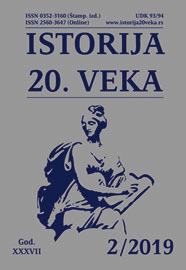VREDNOVANJE RADA I ŽIVOTNI USLOVI NEMAČKIH RATNIH ZAROBLJENIKA ZAPOSLENIH U PRIVREDI JUGOSLAVIJE 1945–1949.
VALUATION OF WORK AND LIFE CONDITIONS OF GERMAN POWs HIRED IN THE YUGOSLAV ECONOMY 1945-1949
Author(s): Saša IlićSubject(s): WW II and following years (1940 - 1949)
Published by: Institut za savremenu istoriju, Beograd
Keywords: Prisoners of War; Germans; Professional Work; Value of Work; Conditions of Life; Ideology; Yugoslavia
Summary/Abstract: At the end of the World War II, numerous POWs were found in Yugoslavia. Although estimates differ significantly, depending on the author, it is undeniable that they were mostly Germans. At the same time, experts of all professions were lacking for Yugoslavia's economic plans. Therefore, after the initial non-selective use of the POWs as labor force (manual mass jobs), the authorities began to search for prisoners with various professional qualifications. The work of the POWs had its economic value, which was expressed in the price calculations from the earliest days. The salaries they earned were paid to the special Land Reconstruction Fund. Requests for specialist labor, however, from August 1945 and especially during 1946, resulted in certain incentives in money or goods (cigarettes) given directly to the POWs. In order to motivate the work of the POWs, the Yugoslav authorities introduced more personal awards, such as the right to increased nutrition, the introduction of norms, and other measures. In this way, some prisoners could provide funds for their personal consumption, better living and working conditions, and even recommend themselves to conclude their labor contract and be released from the camp. After the first period of imprisonment, when there were many cases of unjustified punishment, exhaustion, torture, and murder, better times followed (though far from good). The period of hunger gave way to a time when rules guaranteed a solid food regimen, but in practice there were too many anomalies. A similar situation was with the supply of clothing and footwear, as well as accommodation and health care. Nevertheless, by 1947, the situation in all these segments had improved significantly. A special segment of the engagement of the state and the Communist Party was the ideological work among the POWs, which was aimed at denationalization and re-education in the spirit of the idea of communism. Antifascist committees (Antifa) were organized for this purpose, a prisoners' press was published, wall newspapers were made, cultural and sports events organized, and instructors worked among the prisoners.
Journal: Istorija 20. veka
- Issue Year: 2019
- Issue No: 2
- Page Range: 157-176
- Page Count: 20
- Language: Serbian

